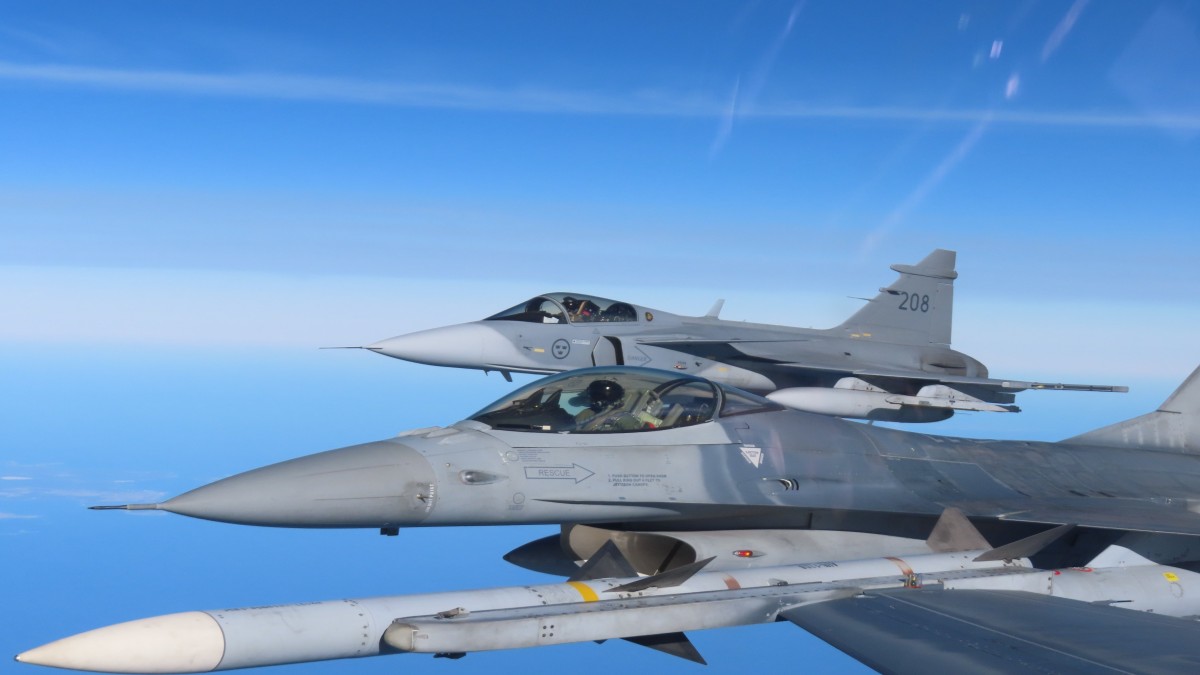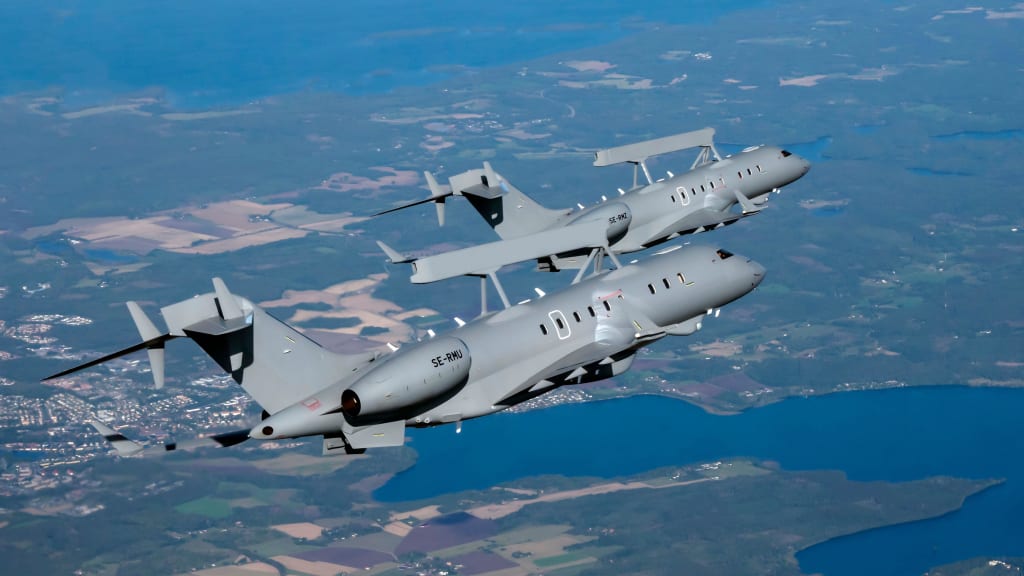Despite suffering several setbacks in fighter jet deals over the previous years, the Swedish defense manufacturer Saab has made a comeback with its ‘Global Eye’ early warning aircraft.
The United Arab Emirates (UAE) Ministry of Defence (MoD) announced on April 24 that a ceremony marking the reception of the Saab early warning aircraft had been hosted at the Al Dhafra Air Base recently.
The Air Force and Air Defence (AFAD) commander, Major General Ibrahim Nasser al-Alawi, was quoted by media reports as stating that the aircraft was a “qualitative addition” that would aid in defending the nation’s strategic interests.
The UAE MoD also released a video showing a Saab GlobalEye airborne early warning and control (AEW&C) aircraft without AFAD markings being escorted by F-16 and Mirage 2000-9 fighters before its landing at the Al Dhafra base.
The GlobalEye has been described by Saab as a sophisticated multi-domain AEW&C system that offers long-range object detection and identification on land, at sea, and in the air with a variety of active and passive sensors. The GlobalEye facilitates improved situational awareness of the surrounding areas and early threat detection by providing units in the Air Force, Army, and Navy access to real-time information.
The GlobalEye system integrates Saab’s Erieye Extended Range radar, installed atop the fuselage of the Bombardier Global 6000 long-range business jet. The FLIR (Forward Looking Infrared) Systems Safire electro-optical system and Leonardo Seaspray 7500E radar, installed in pods beneath the fuselage, allow the GlobalEye to conduct both land and marine surveillance, despite the company’s description of it as an AEW&C.
Saab confirmed that it delivered the fourth Global Eye ordered by the UAE on April 18.
“I am proud to celebrate the fourth delivery of our world-leading AEW&C solution GlobalEye to the UAE and to continue supporting its operational availability and mission success. The high delivery pace in the GlobalEye program is a testament to our unique in-house capability, which means we control the entire process, from development to integration,” said Micael Johansson, President and CEO of Saab.
The UAE became the first customer of the aircraft following the announcement of an order for two GlobalEyes during the November 2015 Dubai Air Show. A third aircraft was ordered in 2017. Later, the kingdom ordered two additional aircraft in 2021, bringing the total to five.
We have delivered the 4th GlobalEye aircraft to the UAE customer. #sensors #airforce #AEWC pic.twitter.com/HmyWPzXkYW
— Saab (@Saab) April 25, 2024
The recent delivery follows the deliveries of three GlobalEye to the UAE in 2020 and 2021. With the fourth delivery completed, one aircraft remains to be delivered. According to its official website, the manufacturer was proud to deliver the fourth aircraft in just four years.
The ceremony organized by the UAE was significant as it emphasized the rising popularity of SAAB’s AWACS aircraft even as the company continues to struggle to sell its latest cutting-edge fighter jet, the Gripen-E, to foreign customers.
Global Eye Steals The Limelight
Over the past decade, Saab has struggled to find buyers for its Gripen jets in the global market. The last major victory for the Gripen fighter came when Hungary announced on February 23 that it had signed a deal to acquire four Saab JAS Gripen fighter jets from Sweden.
However, its Gripen-E jets, the most advanced in the series are yet to take off. The aircraft last saw success when Brazil signed a US$5.4 billion contract to purchase 36 aircraft built in Sweden in 2014.
That marked the last success in an overseas competition for Saab, following earlier successes in exporting the Gripen to Hungary, the Czech Republic, South Africa, and Thailand.
Saab’s fortunes, however, declined after 2014 as a result of multiple contract setbacks. The Gripen fighter jet’s continued failure to find success led to Saab President and CEO Micael Johansson calling it frustrating in 2022.

Saab’s attempts to market the more advanced Gripen-E aircraft at a cost-effective price proved futile. The Gripen was repeatedly trailed by the American fifth-generation fighter, the F-35 Lightning II, which was slowly establishing its dominance in Europe, and the Dassault Rafale aircraft.
However, the Global Eye has been a saving grace for Saab’s plummeting reputation. The creation of the GlobalEye has allowed Saab to re-enter the global AEW market, building on the success of its previous Erieye-equipped regional airliners, the Saab 340, 2000, and Embraer 145.
The company supplied Poland with two Saab 340s fitted with Erieye radars so that Warsaw could fulfill an immediate need for AEWs. These aircraft were previously operated by the UAE but were handed back to SAAB after the delivery of the GlobalEyes.

The domestic sale of two aircraft for the Swedish Air Force, scheduled for delivery in 2027, has also added to the GlobalEye sales. SAAB has been aggressively promoting the aircraft to South Korea, which is looking for more AEW platforms to supplement its current fleet of Boeing E-7s.
At one point, Saab was trying to sell the Global Eye to NATO countries looking to replace their E-3 Sentry aircraft. In February 2023, the NATO Support and Procurement Agency requested information from Saab regarding the replacement of its current fleet of E-3 Sentry aircraft. However, NATO decided to acquire the E-7 Wedgetail in November 2023.
Despite the failures, the manufacturer remains optimistic that customers will eventually line up. Tomas Lundin, head of sales and marketing for Saab’s Airborne Early Warning and Control platforms, said in November last year that “there is confidence about securing more sales…We are confident because the GlobalEye exists, it is in operation, it is the latest technology available and it is under contract, and we are building and flying it — it is not something on a PowerPoint slide,” Lundin added.
Lundin also disclosed that a French group had flown aboard the GlobalEye aircraft in Sweden after Saab briefed French defense authorities about the aircraft during the Paris Air Show. Similarly, the aircraft is being aggressively pitched to the Canadian and Hellenic Air Forces as well.
- Contact the author at sakshi.tiwari9555(at)gmail.com
- Follow EurAsian Times on Google News




